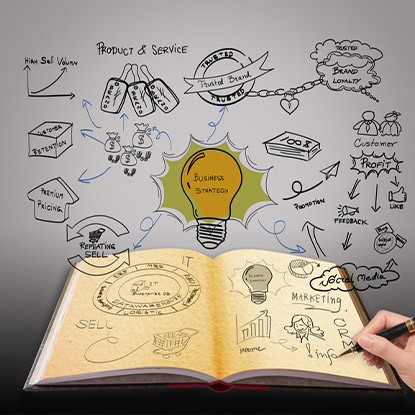Cloud Invoice Management in ERP Systems
Explore the advantages of seamless ERP integration with cloud-based invoice management. Learn how automation and accuracy enhance financial operations in this informative blog.

Explore the advantages of seamless ERP integration with cloud-based invoice management. Learn how automation and accuracy enhance financial operations in this informative blog.

In today’s rapidly evolving business landscape, effective management of resources and data is paramount to success. This is where Enterprise Resource Planning, often referred to as ERP, takes center stage.
ERP is a comprehensive software solution that plays a pivotal role in streamlining and optimizing various aspects of business operations. In this article, we will delve into the world of ERP, demystifying its intricacies and highlighting its significance in modern business management.
Join us on this journey as we explore how ERP empowers cloud invoice management to enhance efficiency, agility, and profitability by seamlessly integrating critical functions across the enterprise.
Unlock Financial Efficiency Today!
Experience lightning-fast invoice processing and payment automation with InvoiceAction as part of the Artsyl ecosystem. Say goodbye to data entry errors and hello to streamlined financial operations.
Book a demo now
One of the core advantages of integrating cloud-based invoice management within your ERP system is the significant streamlining of invoice-related processes. Traditional paper-based invoice management can be cumbersome, error-prone, and time-consuming. However, with the integration of cloud invoice management in ERP, businesses can revolutionize how they handle invoices.
ERP systems, when integrated with cloud-based invoice management solutions, can automate the entire invoice processing workflow. This means that invoices are electronically captured, validated, and matched with purchase orders and receipts. The need for manual data entry and verification is drastically reduced, leading to faster processing times and reduced errors.
Cloud integration ensures that all relevant stakeholders have real-time access to invoice data. This enables quicker decision-making and better visibility into financial operations. Managers can monitor the status of invoices, track expenses, and gain insights into payment cycles without delays.
RELATED: What Is Cloud-Based Invoice Management
Cloud-based invoice management allows for seamless collaboration with vendors and suppliers. Invoices can be shared electronically, reducing the need for physical paperwork and manual communication. This fosters better relationships with suppliers and promotes transparency in financial transactions.
ERP systems equipped with integrated invoice management offer robust reporting and analytics capabilities. Businesses can generate customized reports, track key performance indicators, and identify areas for improvement in their invoice management processes.
Another advantage is the ability to integrate invoice management with other ERP modules. This means that financial data is seamlessly shared across various departments, enhancing overall business efficiency.
As you can see, the integration of cloud-based invoice management within your ERP system not only enhances accuracy but also streamlines the entire invoice handling process. Businesses can experience improved efficiency, reduced costs, and greater control over their financial operations. This transformation is not just about digitizing invoices; it’s about elevating the entire financial ecosystem within your organization.
Revolutionize Your Finance Department
Discover how ArtsylPay’s powerful integration with your enterprise cloud ERP can supercharge your financial system. Reduce errors, cut costs, and boost productivity—all with a single solution.
Book a demo now
When it comes to enhancing your business’s financial operations, the integration of cloud-based invoice management within your ERP system offers a range of powerful features. These features not only streamline the invoice processing workflow but also contribute to improved accuracy, efficiency, and cost savings. Let’s explore some of the key features that make cloud invoice management in ERP a game-changer.
Cloud invoice management solutions integrated with ERP systems excel in automatically capturing invoice data. They use optical character recognition (OCR) technology to extract information from scanned or digital invoices. This eliminates the need for manual data entry, reducing errors and saving time.
These systems provide validation checks to ensure that invoice data aligns with purchase orders and receipts. Any discrepancies or errors are flagged for review, preventing incorrect payments and enhancing accuracy.
Cloud invoice management in ERP enables the automation of invoice approval workflows. Invoices can be routed to the appropriate personnel for review and approval based on predefined rules. This automation accelerates the approval process, reducing bottlenecks and ensuring timely payments.
Paper invoices are transformed into digital documents, making it easy to store and retrieve invoices when needed. This digitization not only reduces physical storage costs but also improves accessibility to historical invoice data.
Cloud solutions facilitate collaboration with vendors and suppliers. Invoices can be shared electronically, and communication about invoice status and discrepancies can occur seamlessly within the system. This enhances transparency and strengthens vendor relationships.
RELATED: What Does Invoice Automation Look Like?
Cloud invoice management within ERP systems offers robust reporting and analytics capabilities. Users can generate custom reports, track key performance indicators (KPIs), and gain insights into invoice processing efficiency. This data-driven approach aids in making informed decisions and optimizing financial processes.
These key features collectively empower organizations to streamline their invoice management processes, reduce manual effort, minimize errors, and gain better control over their financial operations. In the next sections of this blog, we will explore the best practices of integrating cloud invoice management within ERP systems.

Don’t let invoices pile up! Get instant access, validation, and approval with intelligent financial process automation delivered by InvoiceAction. Harness the power of real-time financial insights.
To better understand the tangible benefits and outcomes of integrating cloud invoice management software within an ERP system, let’s explore a few real-world case studies of businesses that have successfully adopted this transformative technology.
Background: A mid-sized manufacturing company was grappling with inefficiencies in their invoice processing. Their manual, paper-based approach resulted in delays, errors, and difficulties in tracking invoices.
Solution: Manufacturing company decided to integrate a cloud invoice management system with their existing ERP. They automated the invoice capture process, implemented validation checks, and established an electronic approval workflow.
Results:
Background: A chain of retail stores, was facing challenges in managing a high volume of invoices from multiple suppliers. They often struggled with duplicate invoices and late payments.
Solution: Retail business implemented a cloud-based invoice management solution that seamlessly integrated with their ERP. The system automatically matched invoices with purchase orders and receipts, preventing duplicate payments.

Contact Us for an in-depth
product tour!
Results:
Background: DEF Services, a service-oriented business, needed to improve their invoice processing to maintain profitability. Manual data entry was causing delays and errors in their financial operations.
Solution: DEF Services invested in an ERP system with integrated cloud invoice management. They automated data capture and validation, reducing the need for manual intervention.
Results:
These case studies demonstrate the substantial advantages that organizations can realize through the integration of cloud invoice management within their ERP systems. From cost savings and efficiency improvements to error reduction and enhanced vendor relationships, the benefits are clear.
Businesses of all sizes and industries can learn from these success stories and consider how similar integration can positively impact their financial operations.
Join the Future of Finance
Embrace payment automation and elevate your ERP game. ArtsylPay electronic payment platform provides the tools you need to thrive in the digital age. Explore the future of financial management now.
Book a demo now
When embarking on the journey of integrating cloud invoice management within your ERP system, it’s essential to follow best practices to ensure a seamless and successful implementation. Here are some key strategies to consider.
Selecting the appropriate cloud invoice management solution is paramount to the success of your integration. Ensure that the chosen solution can grow with your business. Scalability is crucial to accommodate increasing invoice volumes. Also, verify that the solution is compatible with your ERP system and can seamlessly integrate without major customization. Opt for a solution that is user-friendly and provides intuitive interfaces for your team members.
A well-thought-out integration strategy is crucial to avoid disruptions and achieve your desired outcomes. Clearly define your integration goals and expectations. What do you want to achieve with the integration, and how will it benefit your business?
Also, make sure to create a realistic timeline for the integration process, considering factors like data migration, testing, and user training. For that, involve key stakeholders, including finance, IT, and end-users, in the planning process to gather insights and ensure alignment with organizational goals.
Data accuracy is paramount in financial operations. Implement measures to maintain data integrity. Implement invoice validation checks to ensure that invoice data is accurate and matches with purchase orders and receipts. Before migration, clean and organize your existing invoice data to minimize errors during integration.
Tip: Provide comprehensive training to staff involved in invoice management to ensure proper data entry and use of the new system.
Continuous monitoring and optimization are key to long-term success. It helps to conduct regular audits of the integrated system to identify and rectify any issues, discrepancies, or performance bottlenecks. You should also establish a feedback mechanism for end-users to report any challenges or suggestions for improvement.
By adhering to these best practices, businesses can ensure a smooth and effective integration of cloud invoice management within their ERP systems. This integration not only enhances efficiency and accuracy but also positions the organization for continued growth and success in the dynamic world of finance and business management.
Say Yes to Cost Savings
Why waste resources on manual tasks when you can automate? Artsyl InvoiceAction cloud ERP integration brings you cost-saving benefits straight to your ERP. Start saving today!
Book a demo now
Cloud invoice management refers to the practice of using cloud-based software and technology to handle and process invoices digitally. It involves tasks such as invoice capture, validation, approval, and storage in a cloud environment rather than relying on traditional paper-based methods.
This approach streamlines invoice workflows, enhances accessibility, and often includes features like automation and reporting for improved efficiency in financial operations.
ERP invoice integration involves the seamless connection of an Enterprise Resource Planning (ERP) system with invoice management software or tools. It ensures that invoice-related data, such as invoice details and approvals, can be exchanged between the two systems without manual intervention.
This integration improves data accuracy, reduces errors, and accelerates invoice processing within the ERP environment.
ERP invoice accuracy refers to the precision and correctness of invoice data within an Enterprise Resource Planning system. Achieving high invoice accuracy involves minimizing errors, ensuring that invoice amounts match purchase orders and receipts, and preventing duplicate payments. Maintaining ERP invoice accuracy is critical for financial integrity and reporting.
RELATED: Debit Invoice and Debit Note: What Is It
Cloud-based invoice software is a digital tool hosted in the cloud that allows organizations to create, manage, and process invoices electronically. This software provides a platform for businesses to handle their invoicing needs remotely and collaboratively.
Cloud-based invoice software typically offers features like invoice creation, sending, tracking, and reporting while being accessible from any device with an internet connection.
Invoice automation in ERP systems refers to the use of automated processes within an Enterprise Resource Planning system to handle various aspects of invoice management. This automation includes tasks like invoice data capture, validation, routing for approvals, and even payment processing. By automating these tasks, organizations can reduce manual effort, minimize errors, and improve overall efficiency in managing invoices.
An ERP invoice approval workflow is a predefined sequence of steps and actions within an ERP system that governs how invoices are reviewed, approved, and processed. It ensures that invoices follow a standardized path for approval, involving the relevant stakeholders in the organization.
This workflow streamlines the approval process, enhances transparency, and maintains compliance with financial policies and regulations.
Integration with ERP systems refers to the process of connecting external software, applications, or tools with an organization’s Enterprise Resource Planning system. This integration allows data to flow seamlessly between the ERP and other systems, enabling efficient sharing of information.

In the context of invoice management, it ensures that invoice-related data is synchronized between the ERP and external invoice management software.
Invoice data integration involves the harmonious blending of invoice-related information from various sources into a unified and coherent format. This process enables organizations to consolidate invoice data from different suppliers, formats, and systems into a single, standardized dataset. It is essential for accurate reporting, analysis, and decision-making.
ERP cloud migration refers to the process of shifting an organization’s existing on-premises Enterprise Resource Planning system to a cloud-based ERP solution. This transition involves moving software, data, and processes to the cloud infrastructure, which offers benefits such as scalability, accessibility, and reduced infrastructure management costs.
Cloud ERP solutions for finance are comprehensive software platforms hosted in the cloud that cater specifically to financial management needs within organizations. These solutions include modules for accounting, invoicing, budgeting, and financial reporting.
Cloud ERP finance solutions also offer real-time data access, collaboration features, and scalability while minimizing the need for on-premises hardware and IT maintenance.
Cloud invoice management tools are software applications hosted in the cloud that enable organizations to efficiently manage their invoicing processes. These tools often include features like invoice creation, approval workflows, document storage, and reporting. They provide a centralized platform for handling invoices and offer flexibility and accessibility for users.
Invoice validation in ERP involves verifying the accuracy and legitimacy of invoices within an Enterprise Resource Planning system. This process checks that invoices align with purchase orders, receipts, and contractual agreements. Validating invoices in ERP helps prevent erroneous payments and ensures compliance with financial policies and regulations.
Ready to Transform Your Business?
Elevate your financial processes and boost ROI with ArtsylPay intelligent payment automation platform. It’s time to experience ERP integration like never before.
Get started now!
Book a demo now
By integrating business ERP systems with cloud invoice management, enterprises can transform invoice processing into a seamless and efficient operation. This integration eliminates the need for manual data entry and verification, ensuring that invoices are processed accurately and promptly. Businesses can also gain valuable insights into their financial data, enabling them to make informed decisions and optimize their operations.
ERP integration with cloud invoice management refers to the process of seamlessly connecting an Enterprise Resource Planning (ERP) system with cloud-based software or tools designed to manage invoices digitally. This integration allows for the automation of invoice processing, enhancing efficiency and accuracy.
Integrating cloud invoice management with ERP offers numerous benefits, including streamlined invoice workflows, reduced manual effort, improved data accuracy, enhanced visibility into financial operations, and cost savings through automation.
Compatibility can vary depending on the specific ERP system and cloud invoice management solution. It’s crucial to ensure that your chosen ERP system and invoice management tool are compatible or can be customized for integration.
Automation involves tasks like invoice capture, validation, approval routing, and even payment processing being handled automatically within the integrated system. This reduces the need for manual intervention and accelerates invoice processing.
Challenges may include data security concerns, potential resistance to change among employees, the complexity of integration, and ensuring data accuracy during migration. Careful planning and best practices can help overcome these challenges.
Yes, small businesses can benefit significantly from this integration. It can help them automate invoice processing, reduce errors, and improve efficiency, allowing them to allocate resources more effectively and focus on growth.
Ensuring data accuracy involves implementing validation checks, cleansing data before migration, providing training to staff, and conducting regular audits of the integrated system to identify and rectify any errors.

Best practices include considering scalability, compatibility with your ERP system, user-friendliness, vendor reputation, and seeking solutions that align with your organization’s specific needs and goals.
Signs that integration may be beneficial include high volumes of invoices, a desire to reduce manual effort, a need for improved accuracy in financial operations, and the goal of enhancing financial visibility and control.